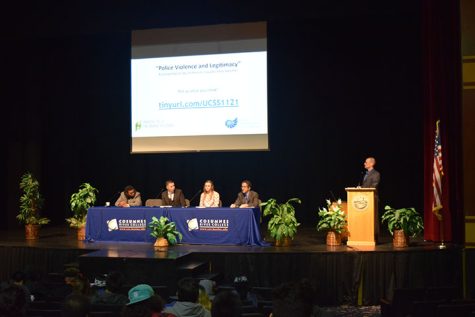Ethics symposium discusses policing tensions
Sacramento State and Cosumnes River College partnered to present the 11th Annual Fall Ethics Symposium. This year’s topic was The Ethics of Policing.
The two-day symposium was broken into six sessions of speakers with different topics regarding policing. CRC hosted the first day and Sac State held the second set of sessions.
The first session, titled Police Militarization and its Impact on Minority Groups, concerned the increasing militarization of community police forces across America.
Speaker Abigail Hall Blanco, a professor of economics from the University of Tampa, said she hoped that those who attended could come to understand how these issues with police greatly impact individuals of racial minorities and disadvantaged backgrounds.
“[The increasing militarization] undoubtedly creates an ‘us vs. them’ mentality,” Blanco said. “You actually see this if you look at policing manuals, if you look at transcripts from their conferences. You’ll see that phrases like ‘battlefield’ are thrown out there instead of calling it their ‘community’, or their ‘civilians’ – they’ll refer to them as ‘enemies.’”
Her session explored the shift in domestic policing since the war on drugs and terror began in the 1970’s.
“Now in the age of social media and everybody having phones to record, I think we’re starting to see that a lot more people are observing problematic interactions with police officers and are starting to notice that this issue, which has been unfolding for decades, is really starting to come to the surface,” said Blanco.
Blanco said she found it important to hold the symposium for students, since they’ll be the ones driving the discussions for issues in the future.
“For college students especially, to be able to talk about and articulate this really uncomfortable issue, is a really critical first step towards how we can go about fixing them,” said Blanco.
She noted the only way to have a fair system is to evenly empower and constrain the police, which is difficult to do.
“I think it is possible but I think it requires some critical policy changes,” said Blanco.
The third session was titled Democratizing Police Accountability: The Role of Cognition.
Speaker Sanjay Marwah, assistant professor of criminal justice from California State University of East Bay, emphasized the importance of the people’s role in these issues and that it should not be treated as just an issue belonging to the police or the government, but one that all citizens are involved in.
“Awareness is the biggest thing. We have to get away from the notion that politicians can solve all of our problems,” Marwah said. “I think we put the police distant from us, we’ve created these barriers, so I think citizens themselves should get more involved in terms of understanding and dialogue.”
He acknowledged tensions between the public and officers and encouraged both sides to be understanding.
“Treat them [police officers] as human beings. Figure out what is the problem,” said Marwah. “Citizens can be helpful in not trying to be judgemental themselves because they want the police to be non-judgemental. You hear the extreme rhetoric and it seems one- sided.”
Marwah said he enjoyed the opportunity for the discussion on campus and that the board hopes to continue this event.
“I appreciate the dialogue and I think we learn a lot about the complex issue from having these discussions,” said Marwah. “It’s not a simple issue. We don’t know everything and we don’t have easy fixes, but you know, maybe we shouldn’t have easy solutions.”

Professors led a discussion on tensions between police and the community on Nov. 21-22.
